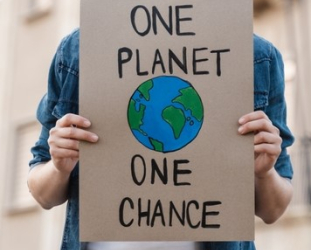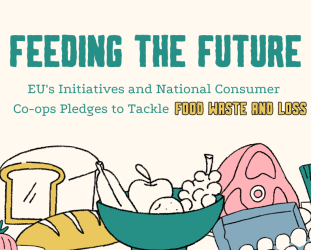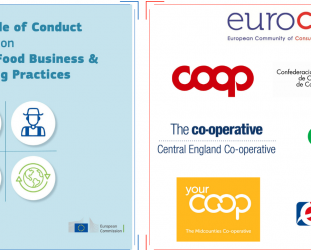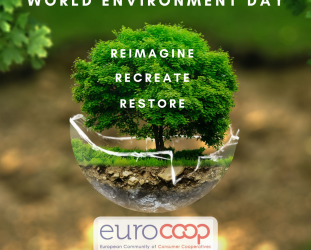Euro Coop’s reply to the European Commission’s public consultation on the Green Paper on Plastic Waste
07.06.2013 10:33:24

Brussels, 7th June 2013
Euro Coop is the European Community of Consumer Co-operatives, whose members are the national organisations of consumer co-operatives in 18 European countries and 1 non-European member. Being value-based enterprises, consumer co-operatives have sustainability at the very core of their mission and continuously strive to improve operations to achieve better results in this field.
Consumer co-operatives grouped in Euro Coop have therefore been at the forefront of initiatives to improve resource efficiency and reduce waste as shown in the report published in 2012: “Climate Change and Consumer Co-operatives: Taking the Challenge forward”, which demonstrates, in a comprehensive manner, progress achieved across a range of issues including waste and packaging.
Also, one of the features which distinguishes consumer co-operatives from other private retailers is their drive to inform and educate their consumer-members. In this respect, many trainings, consumer-awareness campaigns and educational activities have been carried out on the need to pay greater attention to all aspects of waste management with the aim of achieving a greater economic, social and environmental sustainability in the field.
It in this spirit that Euro Coop welcomes the European Commission’s consultation on the Green Paper on Plastic Waste and puts forward its views in the replies provided below. Trusting that you will find this input useful, please do not hesitate to contact us for any additional information you should need.
Questions:
1. Can plastic be appropriately dealt with in the existing legislative framework for waste management or does the existing legislation need to be adapted?
Euro Coop considers that the existing legislative framework for waste management needs to be adapted to better cope with plastic waste. For example, the review of the Landfill Directive in 2014 offers an opportunity to make a step-change in the EU's resource efficiency policy. In this respect, a progressive reduction of landfilled plastic waste, completed with “stretching but achievable” targets should be foreseen. For example, The Co-operative Group in the UK has set the target to ensure that the vast majority of operational waste is diverted away from landfill by 2013. Also, a more efficient and harmonized collection system in all EU 27 Member States should be pursued. Finally, proper implementation and enforcement of the waste legislation need to be strengthened.
2. How can measures to promote greater recycling of plastic best be designed so as to ensure positive impacts for enhanced competitiveness and growth?
To ensure positive impacts for enhanced competitiveness and growth, measures should be designed so as to emphasize cost gains (e.g. decreasing manufacturing costs); improved company image and the possibility to attract new customers.
3. Would full and effective implementation of the waste treatment requirements in the existing landfill legislation reduce sufficiently current landfilling of plastic waste?
Even if it is hard to say whether this would be sufficient, a full and effective implementation of the waste treatment requirements in the existing landfill legislation is surely advisable.
4. What measures would be appropriate and effective to promote plastic re-use and recovery over landfilling? Would a landfill ban for plastic be a proportionate solution or would an increase of landfill taxes and the introduction of diversion targets be sufficient?
In principle, Euro Coop does not agree with a landfill ban. A proper implementation of the waste hierarchy (“reduce, reuse, recycle”) complemented with the setting of gradual targets (“stretching but achievable”) should be a preferred option.
5. What further measures might be appropriate to move plastic waste recovery higher up the waste hierarchy thereby decreasing energy recovery in favour of mechanical recycling? Would a tax for energy recovery be a useful measure?
Mechanical recycling depends on a bundle of factors, among which better ecodesign measures (thinking of the product in all its life cycle, thereby including end-of-life aspects) and an enhanced harmonization of the different European collection systems are key. Euro Coop deems that a tax for energy recovery is not a priority for the moment being.
6. Are specific plastic waste recycling targets necessary in order to increase plastic waste recycling? What other type of measures could be introduced?
Yes, the introduction of specific plastic waste recycling targets is advisable in order to increase plastic waste recycling. Other measures should be aimed at stepping up consumer awareness. In this respect, consumer co-operatives offer, for example, a wealth of in-store experiences, ranging from the indication on the label of how to dispose the packaging, to the fostering of bottle and containers re-use through recharge stations and the sale of bulk-size products. Also, in line with consumer co-operatives’ mission to educate and inform consumer-members, several raising awareness actions are constantly carried out to strengthen the recycling culture.
7. Would further voluntary action, in particular by producers and retailers, be a suitable and effective instrument for achieving better resource use in the life cycle of plastic products?
In addition to that, at European level Euro Coop is also working with other retailers in the Retail Forum for Sustainability, thereby contributing to the stepping up of voluntary action in the field of better recycling and resource use. Several examples of successful voluntary actions in the retailing sector are therefore already in place across Europe but further voluntary action is always advisable so as to create friendly competition and to achieve the desired goals quicker.
8. Is there scope to develop deposit and return or lease systems for specific categories of plastic products? If so, how could negative impacts on competition be avoided?
Yes, the development of deposit and return or lease systems for specific categories of plastic products should be encouraged, also because it is a good means to raise consumer-awareness on re-use and recycling issues. These kinds of initiatives should always be coordinated with the local authorities for better results.
9. What type of information would you consider necessary to empower consumers to make a direct contribution to resource efficiency when choosing a plastic product?
How could information on the chemical content of plastics be made available to all actors in the waste recycling chain?
This could be achieved through an open-source B2B information.
11. How can challenges arising from the use of micro plastics in products or industrial processes and of nano-particles in plastics be best addressed?
Euro Coop highly encourages R&D and innovation, though this must always be carried out with social and environmental concerns at the forefront.
12. Should product design policy tackle planned obsolescence of plastic products and aim at enhancing re-use and modular design in order to minimize plastic waste?
Yes, it definitely should. Also, product design should be sustainable, taking into account end-of-life solutions and respecting the waste hierarchy.
13. Could new rules on eco-design be of help in achieving increased reusability and durability of plastic products?
Yes, they could. As above, they should take into account end-of-life solutions and be centered on the idea of a “closed loop” system.
14. Should market based instruments be introduced in order to more accurately reflect environmental costs from plastic production to final disposal?
Environmental costs are at the moment not adequately reflected in the plastic products’ prices for the final consumer. A life-cycle assessment that also ponders end-of-life costs should be then considered.
15. How can the waste burden posed by short-lived and single-use disposable plastic products best be addressed?
consumer co-operatives have since long offered consumers “bags for life”
made for example of jute or cotton, thereby contributing to the move away from the so-called “throw-away society”.
Another example on the consumer-awareness side is the Coop Italy’s campaign “Water from my own place”. This initiative was aimed at raising consumer awareness about water scarcity and, crosswise, the impact of the consumption of bottled water (mainly plastic) on natural resources. It stimulated the offer of water jugs, carbonators, filters and all instruments needed to improve the quality of tap water and led to the reduction of the quantity of plastic used in the manufacture of the own-brand mineral water bottles.
16. Would it be appropriate to reinforce existing legal requirements by making a clear distinction between naturally compostable and technically biodegradable plastics, and should such a distinction be subject to mandatory information?
Euro Coop is in favour of legislative reinforcement of existing legal requirements concerning what is naturally compostable and what is biodegradable. It also deems that clear, mandatory labelling for the consumer on which products are biodegradable and which products are compostable is needed. Mandatory labelling should also indicate whether a product is recyclable. Consumers should be offered clear instructions on which bins the two different products should be placed in as this is key to increase separation of materials for collection, recycling and/or energy recovery.
(25) Should the EU attach a higher priority to plastic waste in the framework of its "New Neighbourhood Policy", particularly in order to reduce plastic littering in the Mediterranean and in the Black Seas?
Yes, it should as plastic littering in the Mediterranean and Black Seas is an issue which goes beyond the EU’s boundaries.
Euro Coop ID number in the European Commission register of interest representatives: 3819438251-87
For more information, please contact:
Rosita Zilli , Senior Policy Adviser
Euro Coop a.i.s.b.l.
European Community of Consumer Cooperatives
Avenue de Tervueren 12, bte3
B-1040 Brussels
Tel: + 32 2 285 00 72 Fax: +32 2 231 07 57
Email:[email protected]
Latest Sustainability Policy news

Euro Coop Joins +140 Organizations in Urgent Call to Preserve EU Green Measures
Euro Coop stands alongside 140+ civil society organisations in a crucial plea to EU...

EU Overshoot Day - Euro Coop urges EU leaders to tackle the nature, climate and pollution crises
Today marks the EU’s overshoot day, signifying that if global consumption mirrored EU...

Manifesto for agricultural transition to address systemic climate crises
Euro Coop, together with 12 civil society organisations call on the European Institutions to...
Latest Sustainability Policy stories

Euro Coop's New Publication: Addressing the Global Food Waste Crisis on International Day of Awareness
On the occasion of the 2023 International Day of Awareness on Food Waste and Loss, Euro Coop...

Press Release: EU Code of Conduct
Today, the European Commission unveiled the long-awaited EU Code of Conduct on Responsible...

World Environment Day 2021
This year’s World Environment Day marks a perfect opportunity to...

